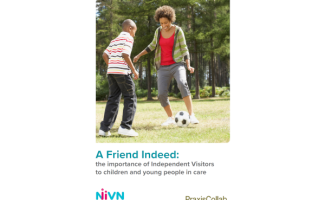Executive summary
The National Independent Visitor Network (NIVN) was established in April 2014 thanks to funding from the Tudor Trust which was awarded to the children’s charity Barnardo’s. Barnardo’s agreed to host the NIVN whilst allowing it to function independently and provide support to all those involved in delivery of Independent Visitor (IV) services. The overall aim of the NIVN was agreed as being: ‘To raise awareness of the role of the Independent Visitor, within an agreed set of national standards’. This was in recognition that despite the role of the IV being a statutory one there was a lack of both awareness and provision. This was later borne out through the findings of a freedom of information data request to local authorities in 2015, which highlighted that 3.2% of the looked after population were matched with an Independent Visitor.
(i) The objectives identified in 2014 for the NIVN to achieve the
overall aim are:
- to improve consistency & standard of IV services
- to increase awareness around the IV role
- to increase numbers of children accessing IV services
- to enable partnership working sharing best practice
- to establish recommended level of provision
To work towards the overall aim and objectives, key outputs were identified for the first 3 year funding period. As a result 9 of achievements from the first 3 years of the project, the NIVN was successful in securing an additional 3 years of funding from the Tudor Trust. The second phase of the work commenced in April 2017 and concludes in February 2020.
This report evaluates the work that was completed at the end of the first funding round and the current work up until October 2019.
The achievements during this period of funding include:
- IV standards for young people developed with young people and disseminated to providers of IV services.
- Development and launch of a film on the role of the IV.
- Further endorsement of the standards by charitable and not for profit organisations and local authority providers.
- Ofsted have updated their assessment framework to include a specific reference to the provision of IV services.
- Development of an outcomes framework and theory of change model.
- Development of a self assessment tool for benchmarking against the IV standards.
- Delivery of a young people’s conference, the second NIVN conference and a networking event
- IV services have been established within four local authorities that didn’t previously have a service.
- Collation and compilation of the second Freedom of Information Data Report (ii)
A key finding from the evaluation is that those involved in delivering IV services value the work of the NIVN. IV Coordinators feel that the NIVN supports peer networking and, in doing so, reduces some of the isolation that they can experience in their roles. There is a strong consensus that the standards have been highly influential in establishing consistency and assisting with negotiations around service delivery at a local level. However, despite the progress, there is a strong sense that there is still some way to go to increase both understanding and awareness of the role of the IV. Providers feel that the NIVN are well placed to lead on lobbying and influencing key stakeholders such as Ofsted and the Office for the Children’s Commissioner and that this work needs to be a priority. Alongside this, one of the major challenges cited by providers is the issue of out of county matches. There are a number of different approaches taken to dealing with this issue and a range of costs for spot
purchase arrangements. Many providers feel that the inherent 11 challenges of offering this service often make it unavailable for young people. Network members would like to see the NIVN lead on work that will help to provide some consistency as to the best approach for meeting this need.
The second Freedom of Information Report was completed just prior to the compilation of the evaluation. The report highlighted that the numbers of Looked after Children (LAC)
matched with an IV has only seen a small increase of 0.3% since the previous report in 2016. Alongside this finding, the report raises a number of issues relating to the provision of IV services and the picture across the country. The findings provide an important opportunity for the NIVN and service providers to consider their next steps in addressing the issues
raised.
Click here to read the full report: NIVN Evaluation Report 2016-2019


